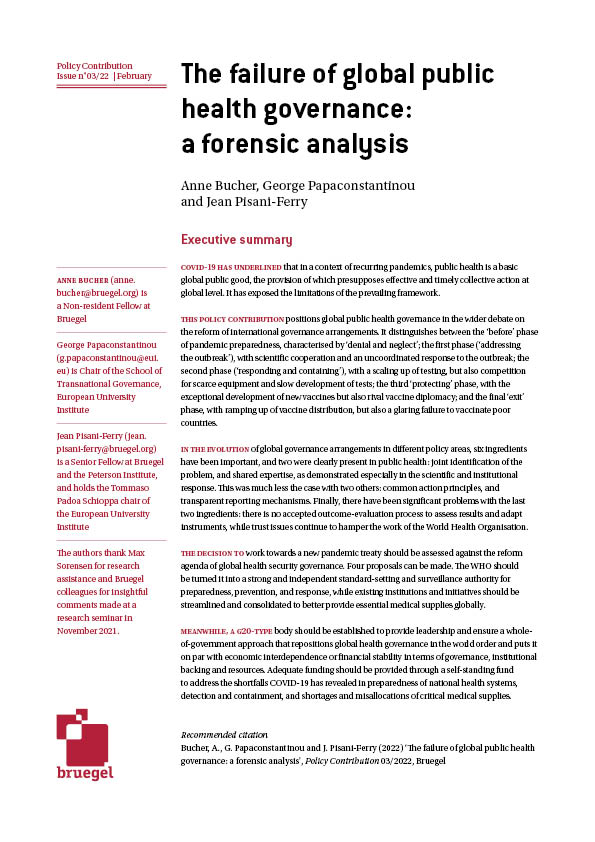Opinion
A temporary, common fiscal stimulus to answer the mayhem of COVID-19
We are not in normal times and we have to surpass, albeit only for the duration of the COVID-19 shock, the hurdles that did not allow the euro-area to endow itself of a common fiscal policy.
A drawback in the design of the euro-area is that we have complete monetary union but no fiscal union, as conclusively argued in the five presidents report of June 2015[1].
In normal times, it has not been possible to achieve fiscal union because of the opposite, but converging in their effects, actions of Italy and Germany, to take the clearest examples. Italy has pursued for many years imprudent fiscal policies and has not implemented the structural measures that would have freed it from economic stagnation. Germany has looked for growth in external current account surpluses rather than domestic demand and has been in the constant fear that some of its European partners were only interested in grabbing its savings.
We are not in normal times and we have to surpass, albeit only for the duration of the COVID-19 shock, the hurdles that did not allow the €-area to endow itself of a common fiscal policy. This can be done using the institutional set-up that we have in an innovative way.
The urgent need to come to common fiscal stimulus derives from two dramatic developments.
First, the euro-area is hit by a very serious economic shock: a fall by 10 per cent of GDP in 2020 is likely. The ECB has taken appropriate monetary policy measures to deal with the shock and has made clear that it is ready to do more, if needed. A matching common fiscal answer is necessary to deal with such a shock, given the economic integration in the euro-area and the need to properly take into account spill-overs of actions carried out at national level.
Second, some countries may not be able to take the necessary fiscal measures without putting in danger their solvability. Of course, while the shock they are dealing with is not their responsibility, the fact that they are in a precarious fiscal position to deal with it is due to their past wrong policies. They should recognize this.
Three layers are needed to come to a fiscal common policy to deal with COVID-19.
The European Council should declare an economic emergency and set the overall framework of the common fiscal action. This should include:
- The period over which the fiscal action should take place, being ready to prolong it if needed
- The overall envelope of the needed funding of the common action, being ready to increase it if needed
- The general instructions to the second layers on the action to be pursued
- The agreement to decide, at the two lower layers of action (see below), on a majority basis.
The just mentioned decisions of the European Council should be taken by unanimity and be endorsed by the European parliament and, where needed, by national parliaments.
The implementation of the common fiscal action would be the responsibility of the EU Commission and the Eurogroup. The EU Commission would make proposals to the Eurogroup which could change or reject them on the basis of qualified majority. The Commission would send instructions to national government about the operational implementation of the common fiscal program.
The ESM would function as debt office of the euro-area, raising the funds that are needed for the decided common action. If needed, based on the above-mentioned decision of the European Council, additional guarantees would be given to the ESM to raise the needed funds.
[1] “It is important to ensure also that the sum of national budget balances leads to an appropriate fiscal stance at the level of the euro-area as a whole. “
Republishing and referencing
Bruegel considers itself a public good and takes no institutional standpoint.
Due to copyright agreements we ask that you kindly email request to republish opinions that have appeared in print to [email protected].












